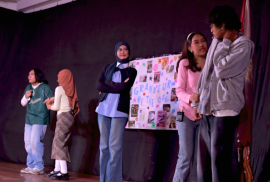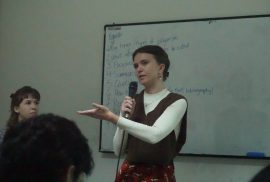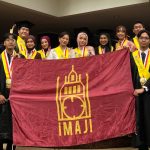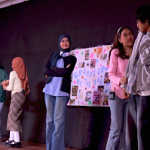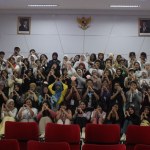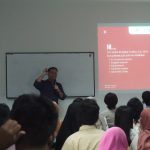Arsip:
Event
Students from the English Literature Study Program at the Faculty of Cultural Sciences, Universitas Gadjah Mada (FIB UGM), organised the yearly English Days 2025 event. The stage play “Deserved It,” an English-language drama with secrets […].
The English Literature Study Program at Universitas Gadjah Mada (UGM)’s Faculty of Cultural Sciences recently hosted a seminar on academic ethics and the integrity of scientific work.
On Monday, April 14, 2025, the English Studies Program held its annual Halal Bihalal gathering at UC Hotel UGM. This event is a cherished tradition following Eid al-Fitr, held each year to foster togetherness and […].
Sasynchronize is an exhilarating event assembled by the batch 2023 of the English Literature Study Program with the aim of strengthening the connection with the batch of 2024.
Join Magang Merdeka at STAR Indonesia to gain new experience as professional linguists/translators! Send your CV, latest academic transcript, and short essay (500-700 words) explaining why you need to participate in this internship program and […].
Congratulations to 2024 English Department Graduates! On Thursday (21/11), Universitas Gadjah Mada (UGM) held a graduation ceremony in Grha Sabha Pramana for 2,049 students that have finished their undergraduate degree.
Exploring the World of Art Deco in English Days 2024 On 29/12/2024, the English Department Students Association (IMAJI) held its annual event, English Days. This event promotes and celebrates the English Department at UGM.
On Monday, 07/08/2024, the English Department arranged a special course for a public speaking training, collaborating with the Swaragama Radio Station. The course will be held for 11 days with three different mentors, Gideon Surya, […].
English Department UGM and Swaragama Training Center proudly present “Scholarship for Public Speaking and Communication Course” program for the students interested in enhancing their public speaking skills.
Career Talk Stepping into the Unknown: Exploring Diverse Countries and Managing Cultural Shock On September 3, 2024, students from the English Department, batches 2022 and 2023, gathered for a career talk with Mrs.

